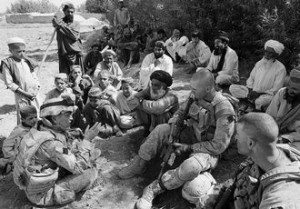
PHOTO:David Guttenfelder/The Associated Press
Josh Habib, far left, a 53-year-old translator for the U.S. Marines, speaks with Afghan villagers and two Marines in the Nawa district of Helmand province.
July 26, 2009 6:00 AM
NAWA, Afghanistan — Josh Habib lay in a dirt field, gasping for air. Two days of hiking with Marines through southern Afghanistan's 115-degree heat had exhausted him. This was not what he signed up for.
Habib is not a Marine. He is a 53-year-old engineer from California who was hired by a contracting company as a military translator. When he applied for the lucrative linguist job, Habib said his recruiter gave no hint that he would join a ground assault in Taliban land. He carried 40 pounds of food, water and gear on his back, and kept pace — barely — with Marines half his age.
U.S. troops say companies that recruit military translators are sending linguists to southern Afghanistan who are unprepared to serve in combat, even as hundreds more are needed to support the growing number of troops.
Some translators are in their 60s and 70s and in poor physical condition, and some don't even speak the right language.
. . . . . . .
At Camp Leatherneck, four U.S.-citizen interpreters spoke with AP but none gave his name for fear of losing his job.
The translators said dozens of linguists quit soon after arriving in Afghanistan in recent weeks. Spangler declined to provide numbers but said “quite a bit” resigned or were fired because they were too old, unfit or couldn't speak Pashto.
Army Sgt. Will Gamez, 26, of Los Angeles, said he recently worked with a linguist who spoke only the Afghan language of Dari, instead of Pashto.
One translator alleged that most of his colleagues cannot speak Pashto, and that some recruits in the U.S. were bypassing the language test administered for Mission Essential by having a skilled Pashto speaker take it over the phone. The company does not require the initial test be taken in person but later gives in-person tests.
Spangler said the military is working its way through dozens of newly arrived interpreters and that the system will weed out the weaker ones by September.
But Gamez said soldiers need translators now, and that some feign sickness to avoid work.
“If he doesn't go out, I can't do my job,” Gamez said. “If locals come up to us, we can't tell what they're saying. They might be warning us about a minefield. They might be warning us about an ambush.”
+++++++Phi Beta Iota Editorial Comment+++++++
Click on the photograph above for the full story online.
How the Pentagon manages to persist in demanding US Citizens eligible for SECRET clearances is the question of the year. In a combat situation, cut-off from the world, a native linguist with a European city ability to speak in English, no clearances, a fit young man until recently unemplpyed–indeed, two of them, to cross check each other at a quarter of the price being paid for overweight elderly white non-hakcers form the USA…the mind simply boggles.
General Al Gray, Commandant of the Marine Corps, nailed in in 1989 when he sought to focus Department of Defense attention on our shortfalls with respect to the Third World, and others nailed it when they pointed out that access to open sources in languages we do not speak was then and remains now the “sucking chest wound” in US intelligence. Perhaps it should not be called intelligence at all, but rather “Dollar Roulette.”
It also troubles us that the Department of Defense has not figured out how to use Telelanguage.com, which could make available, 24/7 thousands of translators able to provide accurate calm translations, including quality control oversight, from their homes or offices worldwide. C4I is supposed to combine communicatios, computing, and intelligence assets in innovative ways. From where we sit, the translation problem is being handled in a 1950's manner and our Marines and Army soliders are at risk because of a lack of imagination and integrity in how this specific program is being managed.



